Balancing Studies and Motherhood: Student Mothers Share Their Stories
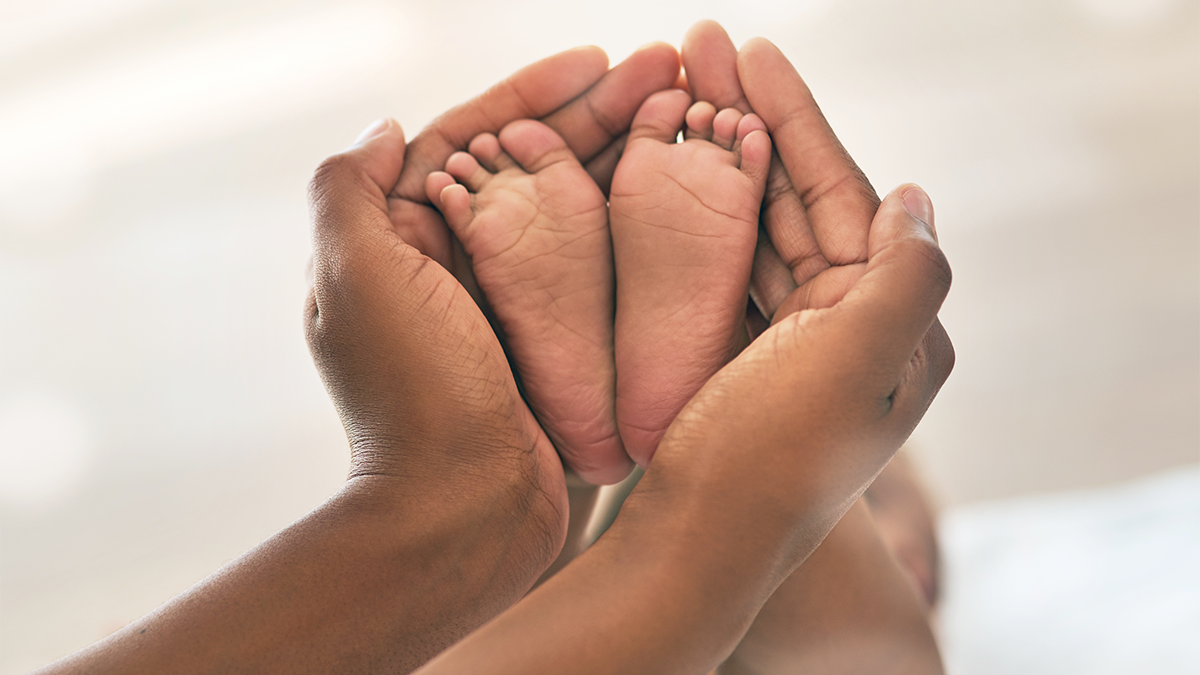
Posted in GUMC Stories | Tagged Biomedical Graduate Education, Mother's Day, School of Medicine, School of Nursing & Health Studies, student experience
(May 7, 2022) — Students pursuing careers in health and medicine have a lot to juggle. For these students who became mothers during their studies at Georgetown, the experience was challenging and rewarding, thanks in part to supportive faculty, staff, classmates and family members.
“‘The baby will make space for itself and everything else will fall into place.’”
— Anamika Bhattacharyya (BGE’12)
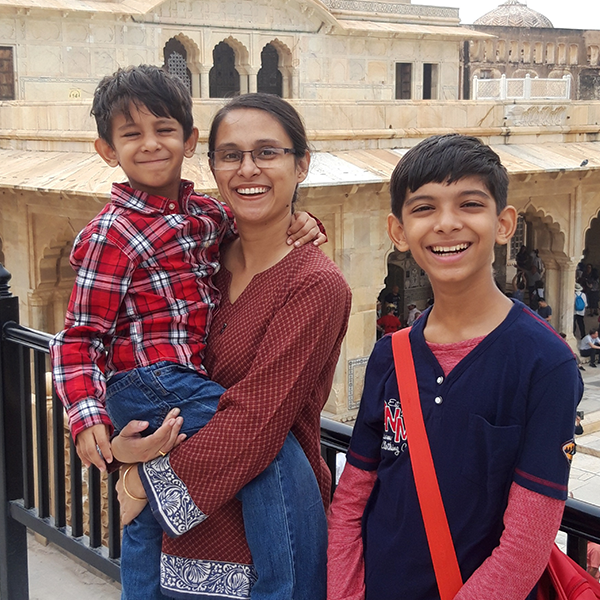
Where were you in your education when you learned that you were going to become a mother? How did that make you feel?
I had my first child in 2007. When I was a second year PhD student in the Department of Cell Biology preparing for my qualifiers, I was diagnosed with some hormonal complications. I was told by my physician that I may have trouble conceiving later because of these problems. This was an overwhelming situation for me and it made me very nervous, as my initial plan was to complete my PhD before having kids. I was sure my PhD would derail if I had a baby at that stage.
Who were the first people at Georgetown that you told you were expecting? How did they react?
Jessica Jones, my PI, was the first person I discussed the matter with at length. I sought her opinion on how to address the situation since a pregnancy could mean certain complications in my case considering the underlying medical condition. Jessica was extremely supportive and encouraged me to consider conceiving. I still remember her words, “The baby will make space for itself and everything will fall in place.”
How did becoming a mother impact your education?
My pregnancy was not easy and I had to take a semester off before the baby was born. During this time, I got helpful guidance from the Office for International Students (I was an international student and taking time off required special formalities for students on F1 visa).
Once I had the baby, Jessica’s accommodating nature allowed me to work flexible hours (working weekends and late evenings) and I was able to manage the load on both ends. I also had immense support from lab mates who would often pitch in with help on my continuing experiments if I was running late due to a pediatrician visit or was unable to come in if the baby was sick.
What do you want people to know about your experience becoming a mother at Georgetown? What advice do you have for others who might be interested in becoming a parent as a student?
My biggest takeaway was that motherhood is possible while one is studying, especially if one has the kind of support system that I had, both at the university and at home. A parent-to-be should be prepared for scheduling their daily routines to work around the child’s needs and for “out of the blue” surprises. Pre-conditioning and preparation allows management of various unique situations in a relatively smooth manner for a scholar parent.
“I quickly learned that I am capable of doing both.”
— Bridget Hagen (G’23)
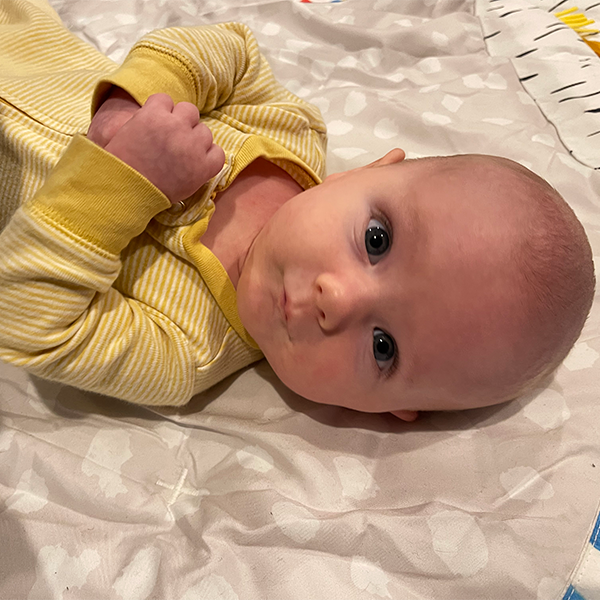
Where were you in your education when you learned that you were going to become a mother? How did that make you feel?
I was accepted in the DNP program for fall 2021 but since I had done my MS at Georgetown I had credits for those classes. I had my baby in November 2021 and started classes in January 2022. I was lucky because I was on maternity leave until March so I was able to ease into the new schedule.
Who were the first people at Georgetown that you told you were expecting? How did they react?
I was not actively in the program at the time … but Dr. [Peggy] Slota was and continues to be very kind and always makes a point to see how [my son] is doing.
How did becoming a mother impact your education?
Becoming a mother taught me a lot about flexibility. Many assignments were completed while breastfeeding or with a baby napping in my arms. Historically, I would have really struggled with the thought of not being able to sit down and focus solely on my work, but I quickly learned that I am capable of doing both.
What do you want people to know about your experience becoming a mother at Georgetown? What advice do you have for others who might be interested in becoming a parent as a student?
I would advise others to take a look at their individual situation, see what they can handle in their life right now, and evaluate what kind of support they have available as that could make or break their success. When I was in my master’s program, it was not the right time for me to start a family as I had too many other commitments.
That being said, my pregnancy prompted me to decide to finish my doctoral education because I wanted to do it before the baby got too big. It is a lot of work and there are a lot of balls in the air at all times, but I am lucky to have a very supportive partner who helps me get it all done.
“It will be difficult but also beautiful.”
— Colleen Huml (M’22)
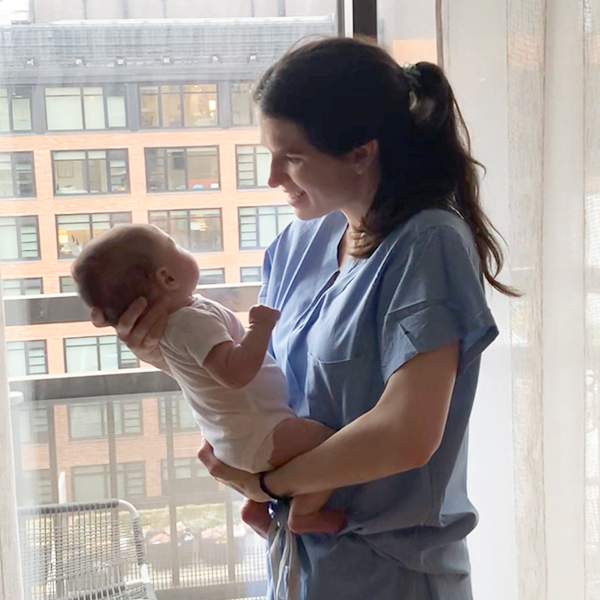
Where were you in your education when you learned that you were going to become a mother? How did that make you feel?
It was June 2020, about three months into the pandemic. I was preparing to start my first clinical rotation of third year (general surgery). I was nervous about navigating the OR during my first trimester and balancing competing priorities, but also incredibly excited.
Who were the first people at Georgetown that you told you were expecting? How did they react?
Amanda Finnell in the Department of Student Affairs. Her excitement mirrored mine and she made me feel wholeheartedly supported, and that was such a gift. I also shared with my mind/body medicine community and close friends. Those combined voices who reassured me this was doable gave me the self-confidence I needed to successfully navigate this new path.
How did becoming a mother impact your education?
Becoming a mother pushed me to take a more assertive role in my education. I became more serious about prioritizing my time as well as my self-care. I reached out to new support networks, and leaned in further to those that already existed. I found mentors in attendings who were also balancing motherhood and a career in medicine, which helped me to not feel alone.
The greatest impact, though, was on my ability to empathize with my patients. I’ve heard it said before that “becoming a mother is every human experience rolled into one.” This was true for me, and my ability to understand my patients and their unique needs grew stronger as a result.
What do you want people to know about your experience becoming a mother at Georgetown? What advice do you have for others who might be interested in becoming a parent as a student?
It was definitely challenging, but it was also the best decision I’ve ever made. For anyone considering a similar path, I would want them to know that Georgetown is a place that supports you and wants you to succeed. My advice is to reach out for support, and lean into the communities around you. It will be difficult, but also beautiful. Go easy on yourself. It will all be worth it.
“It’s an experience you will never regret.”
— Mariama Jallow (M’22)
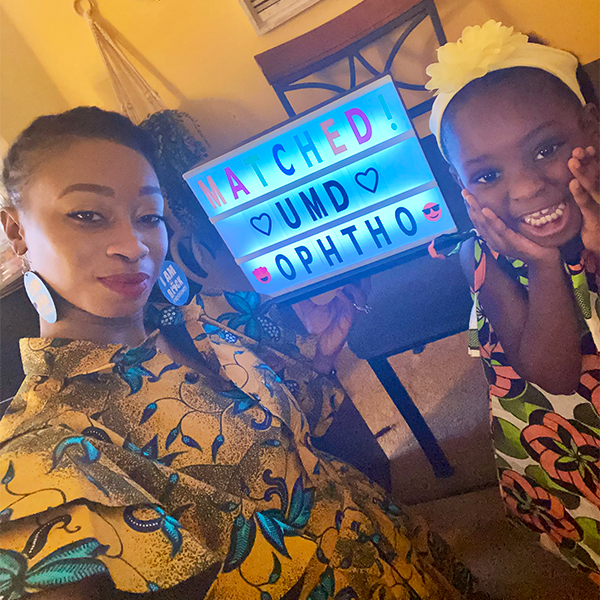
Where were you in your education when you learned that you were going to become a mother? How did that make you feel?
I found out I was going to become a mother after the first quarter of medical school. Though I felt excited about this blessing, I also felt very nervous about the challenges I would face in balancing medical school with motherhood and marriage. I found out I would soon be a mother of two just after concluding my residency interviews this past December. Again, I felt blessed, yet nervous about how this news might impact my transition to residency.
Who were the first people at Georgetown that you told you were expecting? How did they react?
Among the first at Georgetown to find out I was expecting was my dear colleague and super mommy role model Jennifer Gyamfi Holiday (M’22). She had been in a similar situation the year prior and having her as an example provided an abundance of relief and encouragement that the journey I would embark upon was one that I could handle. She met me with an abundance of advice, support, and encouragement that was invaluable to me navigating this news.
How did becoming a mother impact your education?
In becoming a mother in medical school, I learned that there are multiple paths to one’s final destination and each holds special value. During my first pregnancy, I experienced challenges. Thanks to the support of Dean Kumar, I was able to successfully work with the School of Medicine to minimize the impact on my overall medical education.
Balancing motherhood with the remainder of medical school had both unique challenges and rewards that further cultivated my resilience and enthusiasm towards medicine. It provided a lens that has made me a better physician and, over time, a confidence that continues to fuel my success in the field.
What do you want people to know about your experience becoming a mother at Georgetown? What advice do you have for others who might be interested in becoming a parent as a student?
I am grateful for the support, understanding, empathy and encouragement I often received from my classmates, staff and faculty. Sentiments of admiration were often shared, which helped to debunk feelings of imposter syndrome.
My advice to others interested in becoming a parent as a student is that though the unknown might seem impossible, when faced with the opportunity, any one of us can succeed in this endeavor. Taking this leap of faith will not be without difficulty; however, it’s an experience you will never regret!
I hope such students will rest assured that it is possible to embark on this journey and thrive in both pursuits with adequate support from family, friends and a school community that fosters a supportive and accommodative learning environment. I am grateful that Georgetown provided that environment to me.
“You just figure things out.”
— Bailey Weskamp (G’22)
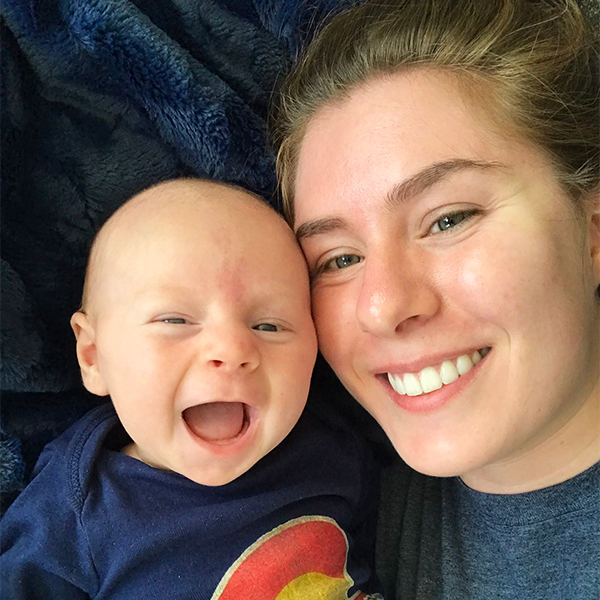
Where were you in your education when you learned that you were going to become a mother? How did that make you feel?
I was in my last semester of school in the DNP Women’s Health Nurse Practitioner program. It was planned and I was extremely excited. I planned my life around things going smoothly with my education, and the pandemic threw a wrench in things. But it was most important to me to have a child and fit my life and schooling around it, not the other way around. I didn’t want to wait and risk infertility and other problems just because there was never a perfect time.
Who were the first people at Georgetown that you told you were expecting? How did they react?
I told a friend, my classmate, and she was very excited for me! There was never a question of the baby causing problems. It was all joy. You just figure things out.
How did becoming a mother impact your education?
I simply had to be more planful. I did homework at night and sometimes had to stay up late while everyone in the house slept. The pandemic and outside factors impacted my education more than my baby.
What do you want people to know about your experience becoming a mother at Georgetown? What advice do you have for others who might be interested in becoming a parent as a student?
My experience has been fairly good, and my professors have been understanding and flexible with me for the most part.
There is never a perfect time, though I do recommend waiting until final semesters, especially when clinicals are over (if you have to do some sort of medical rotations) in school to have a baby. I did not have any family nearby, but with the right partner, you can do whatever makes you happy if you feel it is the right time for you and your family.
With special thanks to these special mothers and those who supported them. Some comments were edited for brevity.
